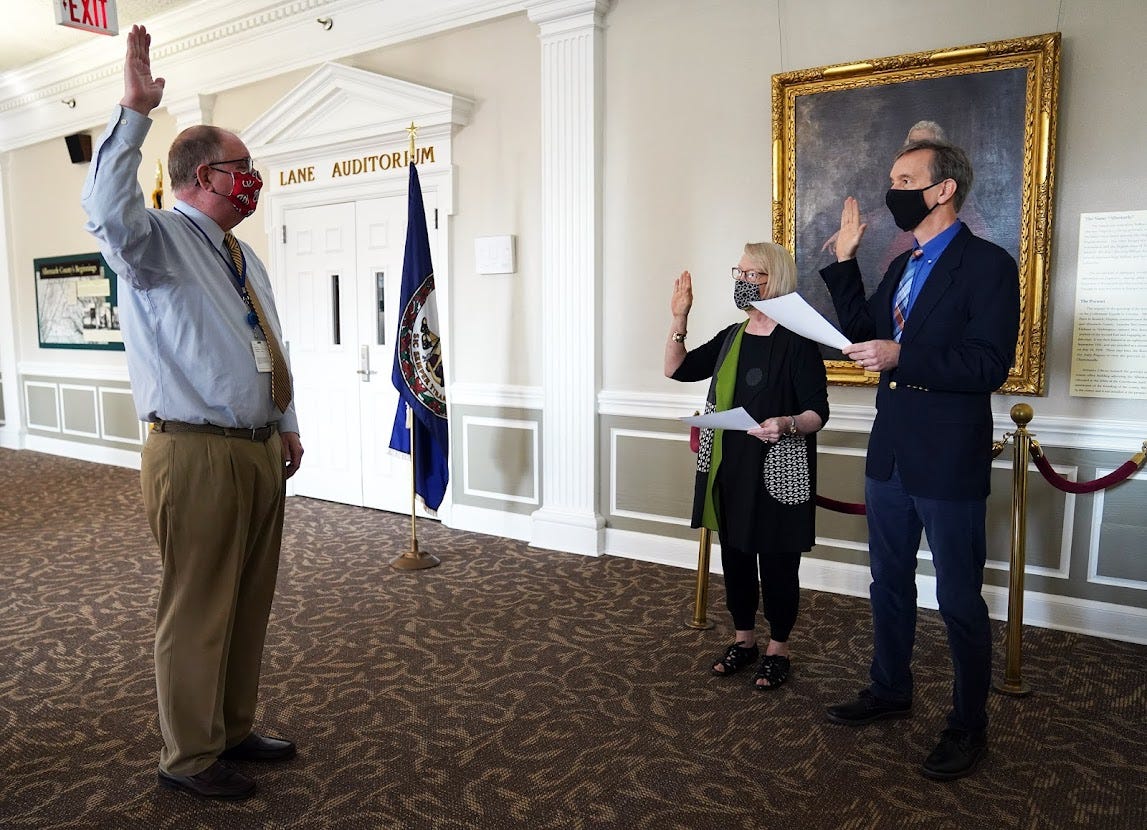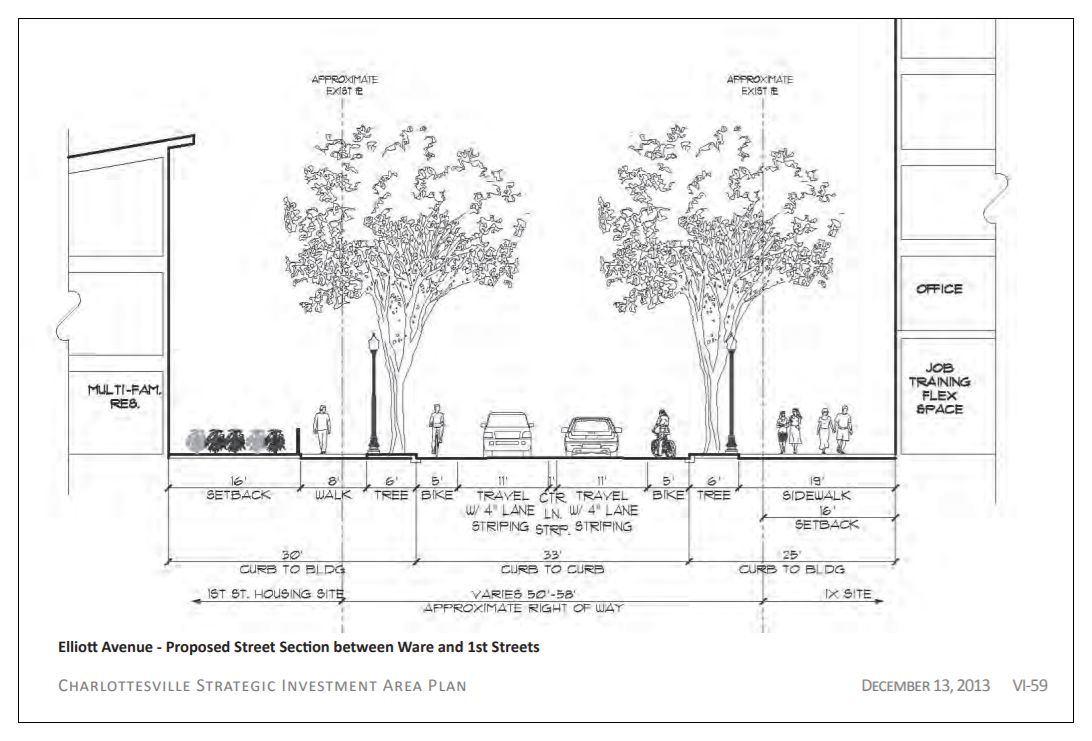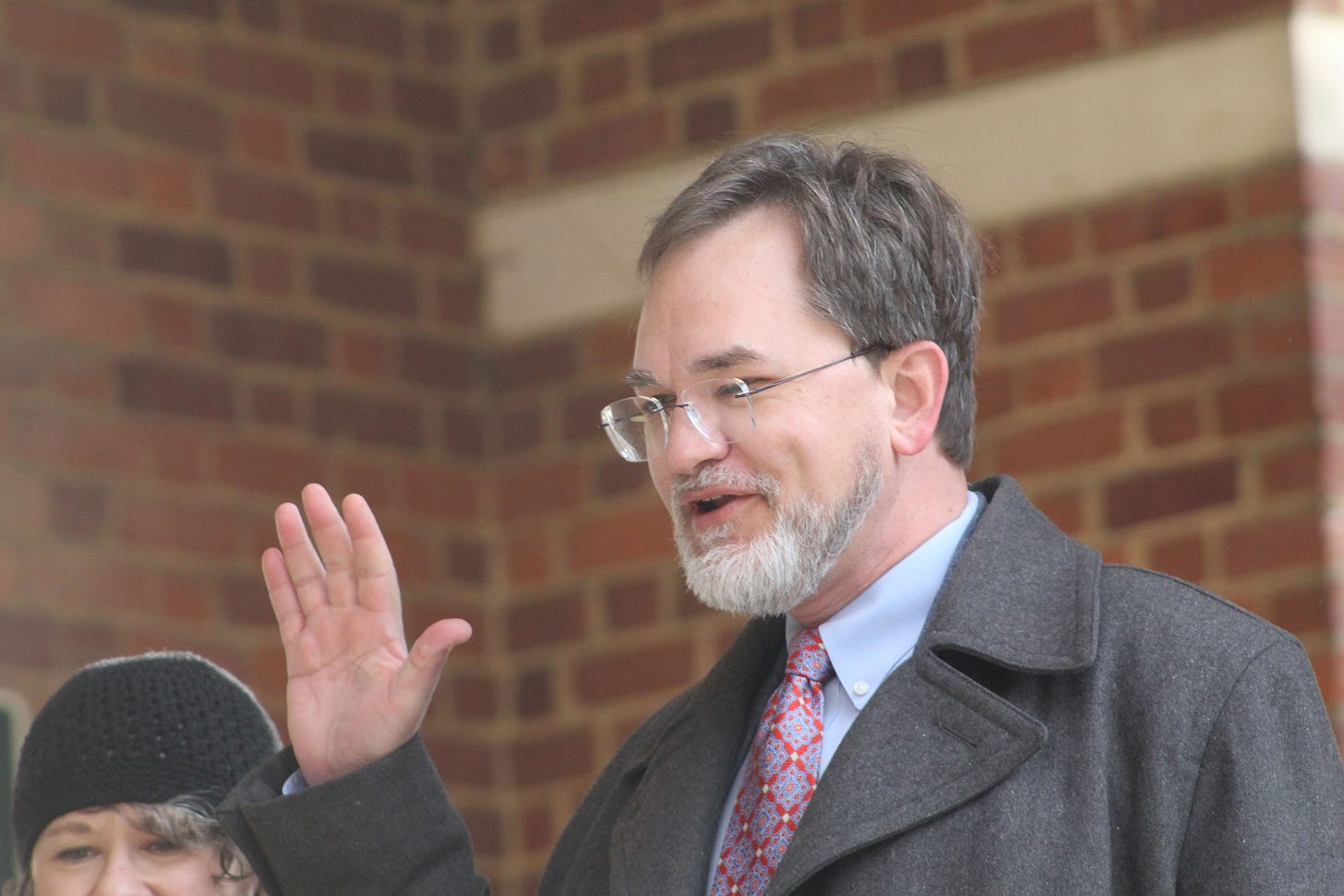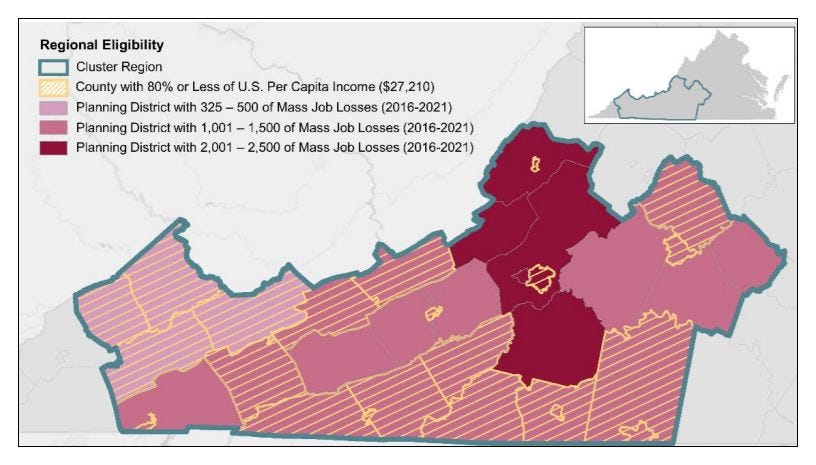We’re now less than a week away from the solstice, which takes place at precisely 10:59 a.m. on December 21 on the eastern coast of the United States. Until then we’ve got a few more days of lengthening night before the pendulum shifts back to light and the march to 2022 continues with new energy. Between now and then there will be a few installments of Charlottesville Community Engagement and this is the one for December 16, 2021. I’m your host, Sean Tubbs.
On today’s show:
Brian Pinkston and Juandiego Wade are officially sworn in as City Councilors, as well as members of the Charlottesville School Board
Virginia Tech and a Richmond consortium have both been awarded half-million grants for economic development
A pair of transit updates, including the fact that Charlottesville Area Transit will remain fare-free for four years
The Charlottesville Planning Commission provides direction on Charlottesville’s next capital budget
In today’s first Patreon-fueled shout-out, Code for Charlottesville is seeking volunteers with tech, data, design, and research skills to work on community service projects. Founded in September 2019, Code for Charlottesville has worked on projects with the Legal Aid Justice Center, the Charlottesville Fire Department, and the Charlottesville Office of Human Rights. Visit codeforcville.org to learn about those projects.
COVID Update
The number of new COVID cases in Virginia continues to climb, but the percent positivity has dipped slightly. This morning the Virginia Department of Health reported another 3,688 new cases and 102 of those are in the Blue Ridge Health District. Statewide the seven-day percent positivity is 8.5 percent and in the BRHD it’s at 7.2 percent.
New elected officials sworn-in
There are still 15 days left in 2021, and City Councilors Heather Hill and Nikuyah Walker have one more meeting on Monday. The near future became a little closer on Wednesday as two incoming City Councilors and three members of the Charlottesville School Board took the oath of office on the steps of Charlottesville Circuit Court.
The School Board went first with newcomers Emily Dooley and Dom Morse sworn in individually with family members at their side. Second-termer Lisa Larson-Torres went next. Then it was time for City Councilor-elect Brian Pinkston followed by Juandiego Wade.
I asked both if they are ready to take on the task.
“You know, I think I’m as ready as I’ll ever be,” Pinkston said. “I joke that it’s a little like getting married or having a kid. You think what you’re getting into but it’s not what you expected. There’s good part and bad parts to that and so the short answer is yes. I’m ready. I’m excited about it. I’m going to roll up my sleeves and try to make a difference.”
“I’m ready, I am prepared,” Wade said. “I feel like I’ve been preparing for this for the last years being connected and involved in the community. I feel like now is an opportunity for me to take my service and my commitment to the city to a different level.”
In a separate ceremony that also took place yesterday morning, the members of the Albemarle Board of Supervisors were also sworn in, including newcomer Jim Andrews, who will represent the Samuel Miller District. Andrews joined third-term Supervisor Diantha McKeel (Jack Jouett) and two-term Supervisor Ned Gallaway (Rio).

Transit updates
In yesterday’s newsletter, there’s a lot of information about planning for a Regional Transit Vision that may include formation of an authority that could raise funds for expanded service. There’s also a second study underway to determine the feasibility of additional routes to serve urbanized portions of Albemarle County as well as Monticello. The results are in from a survey conducted on two potential scenarios according to Lucinda Shannon, a transportation planner with the Thomas Jefferson Planning District Commission. (project website)
“They found that most of the services that people selected in that public outreach was scenario 2 for all three of the areas which is a lot of microtransit connecting with some fixed routes,” Shannon said.
The study also found that 98 percent of people who travel to Monticello do so in a car that they either own or rent. That’s based on 51 respondents. The U.S. 29 North survey got 104 responses and the Pantops survey got 54 respondents. The consultants hired for this project are Michael Baker International and Foursquare ITP.
The next step is a Board of Supervisors meeting on January 19, according to Shannon.
Charlottesville Area Transit will remain fare-free for the next four years. The Virginia Department of Rail and Public Transportation awarded a $1.07 million grant through the Transit Ridership Incentive Program. CAT had already put some of the American Rescue Plan Act funding for this purpose, and the new grant covers fares for an additional year.
CAT Director Garland Williams said he anticipates planned route changes will soon be implemented. The adjustments have been through the public process. Williams briefed the Regional Transit Partnership at their meeting on December 2.
“We’re still moving forward and hoping to be able to implement in January unless something changes,” Williams said.
Learn more about those route changes on the Charlottesville Area Transit website at catchthecat.org.
In other news, Jaunt’s new chief executive officer has named Karen Davis the transit agency’s Deputy Chief Executive Officer. Davis served as interim CEO for exactly a year after the Board asked former CEO Brad Sheffield to resign. Ted Rieck started work as CEO earlier this month after heading a similar transit agency in Tulsa, Oklahoma.
*
Infrastructure grants
Two entities in Virginia have been awarded $500,000 planning grants from the federal government to increase infrastructure necessary to increase commerce and trade. The U.S. Economic Development Authority awarded Build Back Better Regional Challenge awards to Virginia Tech and the Virginia Biotechnology Research Partnership Authority for initiatives that seek to create “regional industry clusters.”
Virginia Tech’s application is called The Future of Transportation Logistics and covers a wide section of southwest and southern Virginia. The idea is to accelerate the adoption of electric and automated vehicles.
“Projections by the World Economic Forum expect freight demand to triple by 2050,” reads their application. “This growing demand poses challenges from environmental degradation to a strained transportation workforce.”
The New River Valley region includes three truck manufacturers, including the national headquarters for Volvo. The work will involve building a coalition to share information as well as demonstration projects such as upgrading a section of Interstate 81 between Salem to Dublin to accommodate automated vehicles.
The Virginia Biotechnology Research Partnership Authority covers the Richmond and Petersburg area and is intended to create an Advanced Pharmaceutical and Research and Development cluster.
“A staggering 73% of Food and Drug Administration (FDA)-registered active pharmaceutical ingredients (API) manufacturing facilities are located outside the United States,” reads that application. ”Overseas pharmaceutical manufacturing not only poses a security risk but also takes essential jobs away from the U.S.”
Both entities will now be eligible to apply for additional funding from the U.S. Economic Development Authority to implement the projects.
Thanks to Route 50 for the information on this grant program. (read their article)
In today’s second subscriber-supported public service announcement: The Charlottesville Jazz Society at cvillejazz.org is dedicated to the promotion, preservation, and perpetuation of all that jazz, and there’s no time like now to find a time to get out and watch people love to play. The Charlottesville Jazz Society keeps a running list of what’s coming up at cvillejazz.org. Sign up for their newsletter today.
Tree canopy decline
At their meeting on Tuesday, the Charlottesville Planning Commission held three public hearings on three big topics. But first, they got updates from various committees. Commissioner Jody Lahendro and he relayed news from the Tree Commission about the forthcoming tree canopy study. A preliminary report states that the percentage of the city covered by trees has shrunk by at least four percent since 2015.
“Because of COVID, the flyover for this tree canopy study was done in 2018 so it’s dated now,” Lahendro said. “The news is not great as you might imagine.”
Lahendro said the city had a tree canopy of 50 percent in 2004 and that declined to 47 percent in 2009.
“In 2014 it went down to 45 percent and in 2018, this latest, it’s to 40 percent,” Lahendro said.
When you break the city down by neighborhood, nine out of 19 recognized areas are below 40 percent. Lahendro said that is the point where both health and economic development is affected.
“And then two of our districts — Starr Hill and 10th and Page — are below twenty percent,” Lahendro said. “Those are where significant detrimental effects are happening.”
Lahendro said the city is projected to lose 360 ash trees to emerald ash borers over the next five years. The city can only afford to treat 30 trees.
Charlottesville’s FY23-27 CIP discussion
The Charlottesville City Planning Commission has made its recommendations for how to amend the draft capital budget for the next five years. That came at the end of a public hearing Tuesday that featured a discussion with City Council. Elected officials will make the final decision next spring as they adopt a budget that will be prepared under the supervision of a yet-to-be-named interim city manager. (draft FY23-FY27 CIP presentation to Planning Commission) (adopted FY22 budget)
The Commission got a look at the information at a work session on November 23, and heard it a second time from Senior Budget Analyst Krissy Hammill in advance of the public hearing. To recap, the capital budget is close to capacity due to the increase of spending in recent years, including a $75 million placeholder for the reconfiguration of middle schools. Council has also authorized a reorientation of priorities to find more money for the schools project. (previous story)
“There were some large projects that were previously authorized to use bonds for that we unfunded essentially to be able to move them to get us to a place where we could increase the $25 million for the school project,” Hammill said. “That was the West Main Street project which was originally in the CIP at $18.25 million and the 7th Street Parking Garage which we unfunded about $5 million of that project.”
Hammill said to pay for the projects, the city will need additional revenue and will not be able to add any more capital projects for many years unless they are paid for in cash. The city has had a AAA bond rating from Standards and Poor since 1964 and from Moody’s since 1973.
“Essentially the AAA bond rating gives the city the opportunity to borrow money at the lowest cost available so that means that more dollars are going to the projects and less dollars are going towards interest,” Hammill said.
Hammill said the city is in good financial shape, but funding future investments will be a struggle. At the work session, Hammill invited ideas for further reallocations from other projects. She also said that the Infrastructure Investment and Jobs Act will likely not be a salvation for the city.
“Many of us in finance have sort of been waiting in the wings to find out what would be available and it’s actually not a one size fits all and it doesn’t deliver on a lot of what we already have in our CIP,” Hammill said. “So it not going to help us address our financing problems largely.”
Another issue is that many of the funding sources will require local matches. She pointed out one opportunity for Charlottesville Area Transit to raise up to $37 million, but the city would have to provide a $2 million match.
“That’s not in our curent CIP,” Hammill said.
Revisising the Strategic Investment Area
The two bodies discussed many aspects of the capital budget, including whether or not several general interest line items should be given additional funds in the next year’s budget. Councilor Lloyd Snook questioned one of them related to a 2013 small area plan known as the Strategic Investment Area.
“One example would be that we’re suggesting another $200,000 for this coming year and three years beyond that for the [Strategic Investment Area] immediate area implementation,” Snook said. “And that balance in that account is over a million and has been as far as I can tell over a million dollars for quite a while.”
Alex Ikefuna, the interim director of the Office of Community Solutions and former director of Neighborhood Development Services, said that balance has been used to pay for a $228,000 study of a form-based code for the area. Nolan Stout reported in the February 4, 2020 Daily Progress on the current Council’s decision to put that plan on hold indefinitely.
Ikefuna pointed to one example of how the funding in the account will be used.
“We have a Pollocks Branch pedestrian bridge which is currently being finalized for construction,” Ikefuna said. “There are several other project within the SIA that consume that balance.”
One of them is a project to upgrade the streetscape on Elliot Avenue in an area where dozens of new homes have been built in the Burnet Commons area. The public housing site at South First Street is also expanding in residential density.
Ikefuna also said the SIA fund could also be used for additional costs that may be incurred at Piedmont Housing Alliance’s redevelopment of Friendship Court.
“Part of the Friendship Court project includes infrastructure improvement because they have to break up that neighborhood and then integrate that into the city’s grid,” Ikefuna said. “And they may have a cost overrun.”
Council approved $5.5 million for the project in October 2020. (read my story)
The current year’s capital budget allocated $2 million in cash for the line item of “Friendship Court Infrastructure Improvements” as well as $394,841 for Phase 1 and $750,000 for Phase 2. The draft five-year capital plan anticipates spending $2.5 million on Phase 2 in FY23, and a total of $3.25 million for phase 3 and $4.5 million for Phase 4.
Ikefuna also said there’s a project called the Elliott Avenue Streetscape for which a design is almost complete. Snook said Council is not given information about what any of these plans are.
“I assume somebody has a plan but it’s not been revealed to us,” Snook said. “I look at the next item. Small area plans. We’re putting in another $100,000 in and the balance of the project is $496,000.”
Outgoing City Councilor Heather Hill had one suggestion for where that funding could go. In July 2020, Council chose to proceed with a Smart Scale project over the opposition of some nearby residents and businesses. (July 22, 2020 story on Information Charlottesville)
“The Grady / Preston / 10th intersection area related to one of the VDOT projects for Smart Scale funding was identified at that time as something we would want to have more planning around because there was a lot of resistance that there wasn’t a lot of community engagement when that proposed plan was coming to fruition,” Hill said.
According to the application for that project, the preliminary engineering phase will not begin until December 2025. There is no design for the Smart Scale project, which was funded on a set of parameters.
“Preston Avenue will be realigned to create a consolidated intersection at Preston Avenue / Grady Avenue / 10th Street,” reads the application. “New sidewalks will be constructed throughout the project limits.”

Hoping for a sales tax referendum
Several commissioners expressed concern about the enormity of the school reconfiguration project. The draft plan shows $2.5 million in FY23 and $72.5 million in FY24. Hammill has previously said the money needs to be in place when a contractor is hired for new construction and renovation of Buford Middle School.
The school project has not yet come directly before the Planning Commission.
“The amount of that project is the entirety of the five-year [capital] FY2017 budget,” Stolzenberg said. “It’s this elephant in the room but it does seem like Council and the School Board have approved the project.”
The idea of a dedicated one-cent sales tax increase has been floated to be dedicated funding for the project, but the General Assembly will have to approve a bill allowing Charlottesville voters decide on whether to impose it.
“I really, really hope that if we go through with it that the sales tax comes through and frees us from this burden,” Stolzenberg said.
Later in the meeting, Commissioners discussed several potential recommendations. One was whether to recommend increasing the amount for affordable housing. Here’s what’s in the proposed CIP.
$3 million for the Charlottesville Redevelopment and Housing Authority in FY23, and $9 million in the out years
A base of $925,000 a year into the Charlottesville Affordable Housing Fund
$900,000 a year to the CRHA to administer additional housing vouchers
$2.5 million for the second phase of Friendship Court
In March, Council adopted an affordable housing plan that set an ambitious spending target for each year, as noted by Stolzenberg.
“It’s recommendations are pretty clear,” Stolzenberg said. “Ten million a year. $2 million are tax relief. A million to administration. So it’s really $7 million in direct subsidy and that’s all on page 49 of the plan for reference.”
Here’s what the PC’s recommendations are:
Reduce funding for the 7th Street parking structure funding to the minimum amount necessary to satisfy Charlottesville’s commitment to provide parking for Albemarle County per a 2018 agreement related to the joint General District Court that will be under construction.
Find more more funds for the line items of tree planting, new sidewalks, and bicycle infrastructure, and hazardous tree removal.
Reduce funds going to the line item for economic development strategic initiatives, small area plans, and Strategic Investment Area implementation
Fully fund the Stribling Avenue sidewalk project that Southern Development has agreed to pay upfront for as part of a rezoning that Council will consider in early 2022.
Explore ways to add enhancements to the Drewary Brown Bridge to honor the Bridge Builders, potentially using a portion of funds for the West Main Streetscape.
Increase budget for Charlottesville Affordable Housing Fund and find ways to fund housing requests that were requested but not included in the draft budget, possibly directing any budget surpluses for this purpose.
On Monday, City Council will hold first of two readings on a proposal to reallocate the $5.5 million surplus from FY21 to employee compensation and bonuses. They’ll also consider the transfer of $6.7 million in cash from a COVID reserve fund into the Capital Improvement Plan Contingency Fund. (staff report)



















Share this post